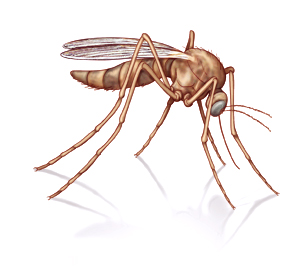West Nile Virus Fact Sheet

West Nile virus (WNV) infects birds and some mammals throughout the U.S. Mosquitoes become infected when they bite a bird or mammal that carries the virus. People may become infected when a mosquito with the virus bites them. Most WNV infections are very mild or cause no symptoms at all. Only 20% of those infected get a mild illness 3 to 14 days after exposure. Symptoms may last 3 to 6 days. They consist of a mild flu-like illness with low-grade fever, muscle aching, loss of appetite, vomiting, headache, and rash.
A small number of infected people will develop severe infection with encephalitis or meningitis. Encephalitis is inflammation, infection, or swelling of the brain tissues. Meningitis is inflammation or infection in the membrane that surrounds the brain and spinal cord. Both cause very severe headache, stiff neck, and sometimes drowsiness or confusion. Other symptoms of severe WNV include weakness, trouble walking, paralysis, and seizures. People older than age 50 and those with weak immune systems are at highest risk for severe illness. There is no specific treatment for WNV. People with only a mild illness often recover fully.
Note: The number of WNV cases in the U.S. varies from year to year. For the latest information, go to the CDC's West Nile virus web page at www.cdc.gov/westnile/index.html.
Preventing infection
This infection can't be spread from person to person or from a bird or mammal to a person. The only way to get WNV is from a mosquito bite. The risk of being bitten by a mosquito is greatest from April to October. The best way to prevent getting this illness is to not get bit by mosquitoes.
-
Limit your time outside when mosquitoes are most active (early morning and late afternoon and early evening).
-
If you are outdoors when mosquitoes are active, wear socks, long sleeves, and long pants. Also use insect repellent. The most effective and commonly available insect repellents against mosquitoes contain either DEET (10% to 30%), picaridin, or oil of lemon eucalyptus. With DEET-containing repellants, the higher the percentage of DEET, the longer it will last. Don't use sunscreen that contains DEET because the sunscreen generally has to be reapplied more often than the insect repellant should be. Don't put DEET on the hands of small children who may put their hands in their mouths or rub their eyes. To apply DEET to children, spray on your own hands, then rub your hands over the exposed skin of your child. Be sure to wash off the repellant when you, or your child, will no longer be exposed to mosquitoes.
-
You can spray your clothing with a repellent containing DEET or permethrin. If you do this, you do not need to put repellent on the skin under clothing that has been sprayed.
-
Mosquitoes lay their eggs in standing water. Remove breeding areas around your home. Dispose of cans, containers, and tires that may collect water. Clear your roof gutters and be sure they drain well. Keep window and door screens in good shape.